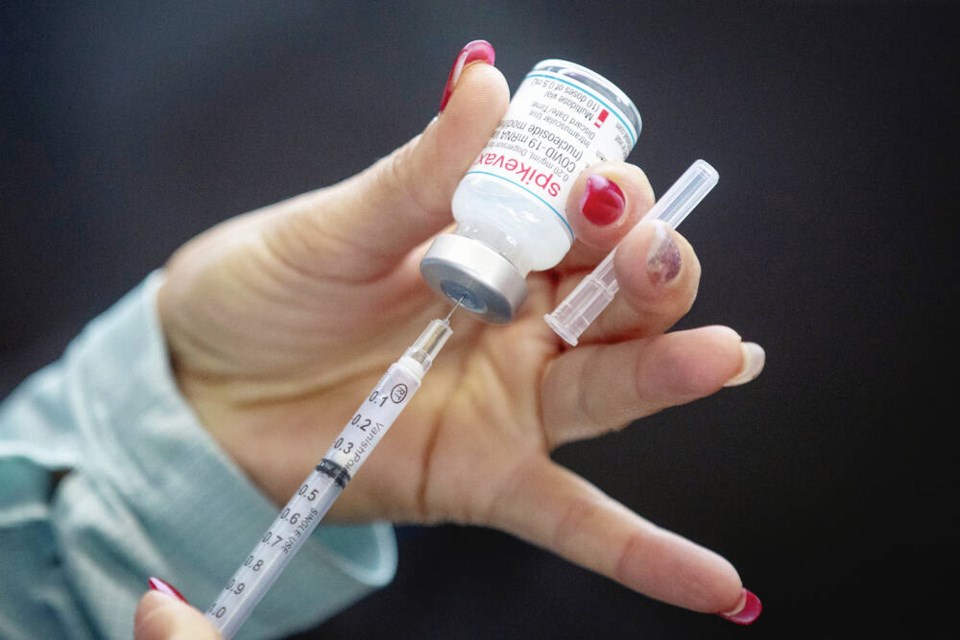The Omicron BA.5 subvariant continues to infect British Columbians at a high rate as immunity from both vaccinations and infections wanes, according to a report from the COVID-19 Modelling Group released Wednesday.
An expected rise in cases this fall is based on waning immunity rather than the threat of new variants, according to the latest COVID modelling projections.
None of the new variants cropping up in recent weeks are common enough or growing fast enough to account for the recent increase in infections, the report says.
“Waning immunity will drive another wave of infections, even without the spread of new variants, unless there is substantial uptake of vaccinations,” it says.
That growth will reverse once immunity is restored through vaccination or new infections, it says.
Under-reporting of cases remains extremely high, says the report. Infections in the province are estimated at 1,000 a day, one-hundred-fold more than reported.
The modelling report suggests almost everyone in B.C. now has antibodies to the COVID-19 spike protein through either vaccination or infection — more than 55 per cent of the population had been infected by the end of July, according to blood samples.
Other Canadian provinces are also seeing BA.5 continuing to dominate, says Sally Otto, an evolutionary biologist at the University of B.C. with the COVID-19 Modelling Group.
The fall booster campaign now underway in B.C. offers a bivalent vaccine — a combination of spike protein strains that target the original Wuhan virus and Omicron BA.1 subvariant.
While the U.S. is distributing a bivalent vaccine targeting the Omicron BA.4 and BA.5 strains, provincial health officer Dr. Bonnie Henry said last month that Moderna’s bivalent vaccine targeting BA.1, approved by Health Canada, works against all Omicron strains, including BA.5.
The Omicron strains are not dramatically different she said.
The COVID-19 modelling group says both the original COVID-19 vaccines and bivalent help build immunity but the bivalent vaccine “helps more.”
The BA.4/BA.5 bivalent vaccine approved by the U.S. Food and Drug Administration in August has been tested in mice but not yet in humans, according to another report of which Otto is also a co-author.
“Given that this is the first bivalent booster ever used against COVID-19, it seems prudent to wait for additional safety and efficacy data in humans before rolling out the bivalent targeting BA.5,” says Otto.
In the same report, Dr. Ciriaco Piccirillo writes: “If you are a young, healthy adult or a child, the BA.1 bivalent provides nearly equal protection against BA.1 and BA.5.”
Even the original COVID-19 vaccines still available in Canada provide a major boost, says Piccirillo, a professor and senior scientist at the research institute of the McGill University Health Centre.
“What is important is to get protected with whatever booster is available, particularly at the beginning of this next wave to maximize protection,” he writes. “The existing monovalent vaccines still give you strong protection against severe disease, hospitalization and death.”
That hasn’t stopped some British Columbians from flocking to the United States to get the BA.4/BA.5 bivalent vaccine available there.
A pharmacist at a Walgreens in Ferndale, Washington, who asked not to be named, said of 80 to 100 scheduled appointments each day, about half are for Canadians who say they came to the U.S. specifically for the BA.4/BA.5 bivalent vaccine.
A pharmacist at Walgreens in Port Angeles, however, said she has seen few Canadians asking for vaccinations at her pharmacy.
There are now 367 people with COVID-19 in hospital in B.C., down from a peak of 1,038 in January. Before the highly transmissible Omicron wave, the peak number of people in hospital with COVID was 515.
The decline in hospital admissions in B.C. appears to have stopped, and data suggest the numbers could start to grow again, says the report.
The province says it has a plan to respond to a potential surge in hospital admissions by discharging patients identified as not needing an acute-care bed into the community, or postponing surgeries to free up beds.
>>> To comment on this article, write a letter to the editor: [email protected]



